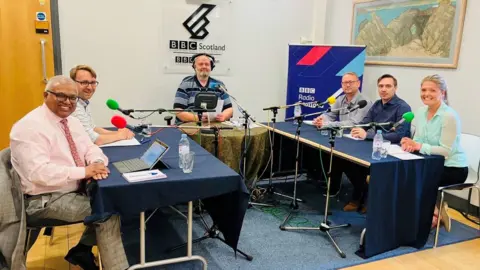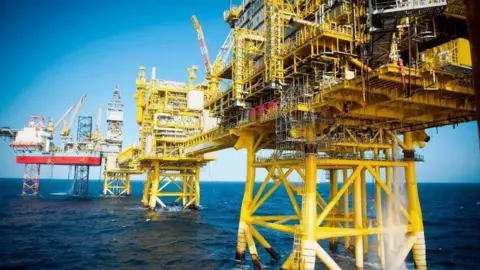Key Gordon and Buchan issues debated by candidates
 BBC
BBCCandidates from all five parties standing for the new Gordon and Buchan constituency in the general election have tackled key local issues in a BBC Radio Scotland debate.
The Reform UK, Scottish Conservative, Scottish Labour, Scottish Liberal Democrat and SNP candidates were involved in the hustings.
Local topics which are seen as important in the rural constituency included the energy industry and the delayed dualling of the A96, as well as national issues such as the integrity of politicians.
Hosted by BBC Scotland reporter Neil Metcalf, the debate is now available on BBC Sounds.
The new constituency includes communities such as Huntly, Balmedie, Turriff and Inverurie.
Previously, Gordon saw an SNP victory in the last general election in 2019.
Meanwhile, Banff and Buchan witnessed a Conservative victory.
'Economic and safety grounds'
SNP candidate Richard Thomson gave his thoughts about the delayed dualling of the A96 between Aberdeen and Inverness.
"I think it’s important that studies are done," he said.
"Because it’s not just about a strategic road between Inverness and Aberdeen, which I feel must be dualled, it’s about making sure the communities along that route, and the alignment that’s eventually chosen, get the most out of that very, very significant investment.
"Now we’ve already invested £200m in the railway between Aberdeen and Inverness.
"I’d like to see it, even when traffic figures don’t justify it necessarily, I think there’s a very, very strong case for dualling from Aberdeen to Inverness on economic grounds, certainly on safety grounds, and I’d like to see us cracking on with the bypassing of the major towns on that route."
'Everyone’s livelihood protected'
Scottish Labour candidate Nurul Hoque Ali was asked about whether he knew in advance about his party's policy not to approve new oil and gas licences.
"I didn’t know particularly ahead of the game but I knew a little ahead of the game," he said.
"Scottish Labour have actually influenced the policy making quite strongly.
"Energy is about security, but it’s also about jobs, and it’s about the security of those jobs, it’s about livelihoods here.
"So we have done everything we can to make sure everyone’s livelihood is protected.”
 Getty Images
Getty ImagesKris Callander from Reform UK spoke about his party's pledge to scrap Net Zero.
"Net Zero, we’ve kind of locked in to this hysteria, based on models that have all since been abandoned – all models from 70s, 80s, 90s.
"This is the basis upon which all the early 2000s climate hysteria started, and this is the basis on which all these kind of bureaucratic vanity projects stem from.
"So we would scrap that and have £30bn to invest in the economy.
"We would also keep all the jobs within this region.”
'Bring integrity to politics'
Harriet Cross, who is representing the Scottish Conservatives, discussed the integrity of the incoming MP being an important factor.
"I’m not going to shy away from the fact that the Conservative party, as other parties have as well, have had more issues than we’d like in recent times.
"I mean it’s not right, I’m not going to stand here and justify it, same way as when I’m on doors to people I don’t try and justify it.
"All I can say is in this constituency here you’ll be voting for someone to represent you, and I believe I am someone who can bring integrity to politics, I am in it for the right reasons, as I said I’m in it to serve the communities across Gordon and Buchan.
"What’s really important is your MP is local, focussed on what’s happening locally and is actually going to deliver for you here."
'Political system is broken'
Conrad Wood, who is standing for the Scottish Liberal Democrats in Gordon and Buchan, spoke about his party's stance on the possibility of future Scottish independence.
"What we want to do is we want to solve the fact that our political system is broken," he said.
"They’re fed up of two governments that just will not get on and everything winds up in the courts.
"We believe we need to reform the United Kingdom, the way that our democracy works, with proportional representation for Westminster, and a new constitution, a federal constitution, that will push more powers to the Scottish Parliament, but also more powers to local councils.
"That stops this issue we’ve got at the moment with councils being strangled with budgets, being told what they have to spend most of their budget on, and therefore our locally elected councillors having very little option but to make the tough decisions they don’t want to make."

